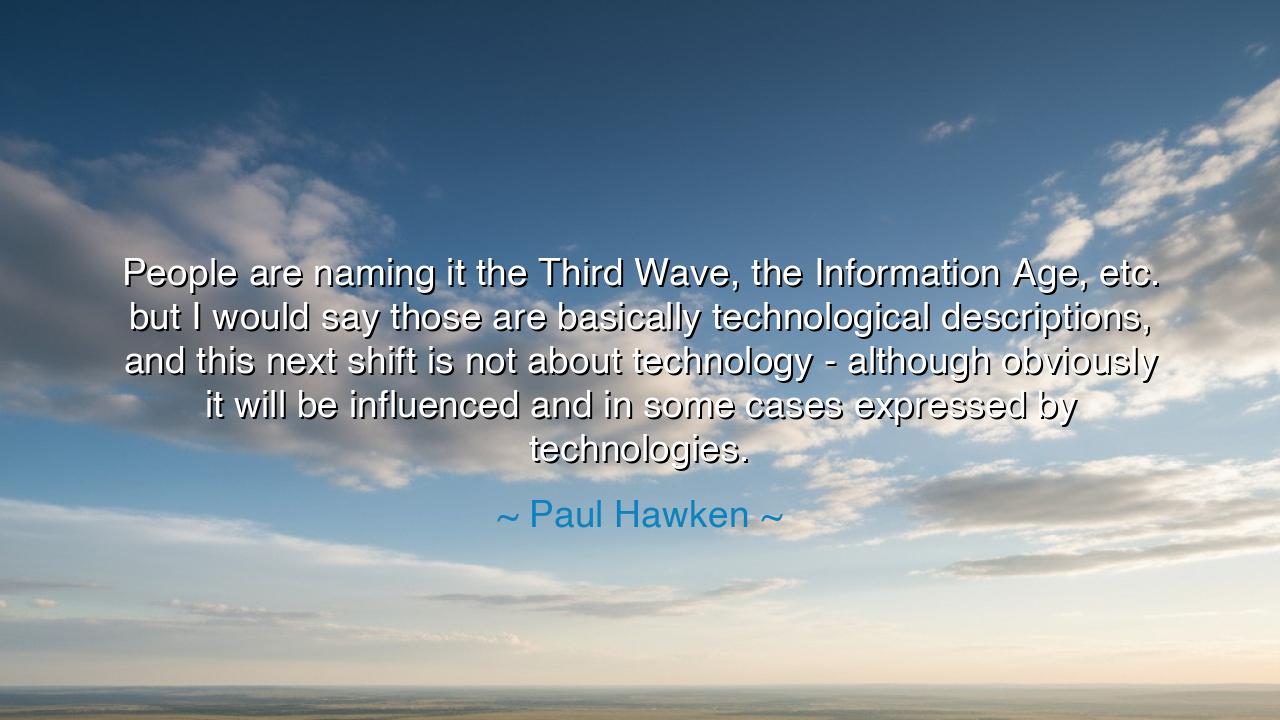
People are naming it the Third Wave, the Information Age, etc.
People are naming it the Third Wave, the Information Age, etc. but I would say those are basically technological descriptions, and this next shift is not about technology - although obviously it will be influenced and in some cases expressed by technologies.






Hear the voice of Paul Hawken, who spoke with vision beyond the surface of things: “People are naming it the Third Wave, the Information Age, etc. but I would say those are basically technological descriptions, and this next shift is not about technology—although obviously it will be influenced and in some cases expressed by technologies.” In these words lies a reminder that the turning of ages is not merely a matter of machines, but of spirit, of values, of the deeper currents that shape the destiny of humankind.
He acknowledges the names given by many—the Third Wave, the Information Age—titles that frame our era as defined by inventions, computers, and networks. Yet Hawken declares that these are only the outer garments of a greater transformation. Technology may be the vessel, but it is not the essence. The true shift lies not in what we build, but in how we think, how we live, and how we relate to one another and to the Earth. This is wisdom that sees beyond the glitter of screens into the heart of civilization’s growth.
History has known such moments before. When the printing press was born, many saw it only as a technological wonder—faster, cheaper ways to copy texts. But its true significance was not the press itself, but the awakening of minds, the birth of literacy for the masses, the spread of ideas that fueled reformation, revolution, and science. Likewise, when the steam engine thundered across the land, it was not simply a new machine—it was the reordering of society, the dawn of industry, the remaking of labor and time itself. In each age, the machine was only the symbol; the true change was within the human heart and structure.
So too in Hawken’s vision. The next shift will not be about devices alone, though they will carry its mark. It will be about a transformation in consciousness, a recognition of interconnection, of sustainability, of humanity’s place within a living world. Just as the Agricultural Age redefined our relationship to land, and the Industrial Age reshaped our relationship to labor, so will this new age reshape our relationship to life itself. The tools may flash in our hands, but the deeper revolution will occur in how we choose to use them.
Consider the environmental movement of the twentieth century. It was not born of new gadgets, but of a new way of seeing—that rivers should not burn with pollution, that forests were not endless, that the Earth itself is fragile. Technology responded to this vision with cleaner energy and new sciences, but the spark came from human conscience. This is Hawken’s warning: do not mistake the tool for the awakening. The machine may reflect the change, but it is never the cause.
The teaching is profound: when you look at the tides of history, do not be blinded by the glitter of invention. Look instead for the deeper current. The loom was not the Industrial Age; the idea of mechanized production was. The computer is not the Information Age; the restructuring of knowledge and communication is. And the new age before us will not be found in chips or circuits, but in the shift of human values toward cooperation, balance, and meaning.
Practical actions flow from this wisdom. Do not chase every new device as though it were salvation. Instead, ask: what deeper change does this reflect? What values are rising, what structures are shifting, what ways of living are being born? Train your eyes to see beyond the object to the transformation it embodies. And in your own life, when you face change, do not focus only on the surface—look for the deeper current beneath, and align yourself with it.
Thus Paul Hawken’s words resound as prophecy: that the next shift in our age will not be merely technological, but human. The machines may glitter, but the true revolution is within us—how we live, how we share, how we awaken to our responsibilities and possibilities. And those who see this clearly will not be dazzled by the surface, but will walk boldly with the tide of history itself.






AAdministratorAdministrator
Welcome, honored guests. Please leave a comment, we will respond soon